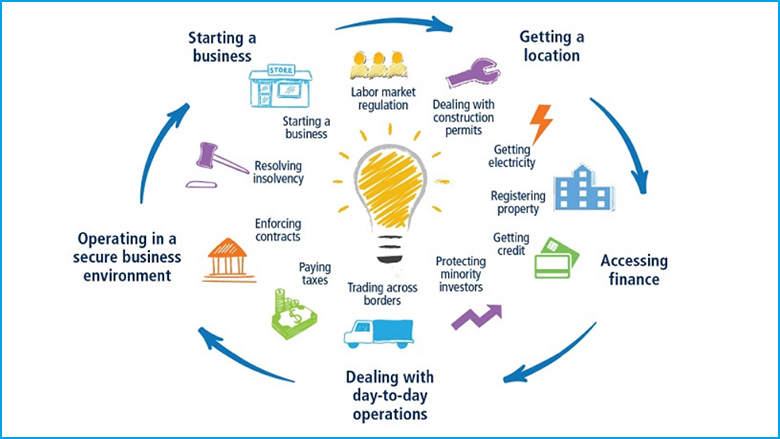Doing Business 2019: Training for Reform
Europe and Central Asia - What are the Ranking Trends?
Georgia, in 6th place in the Doing Business rankings, is the highest ranked economy in the Europe and Central Asia region, followed by FYR Macedonia (10), Azerbaijan (25), and Kazakhstan (28).
The region’s lowest ranked economies are Tajikistan (126) and Bosnia and Herzegovina (89).
Other large economies in the region and their rankings are the Russian Federation (31), Turkey (43), and Ukraine (71).
The region’s economies perform well in the Doing Business areas of Registering Property with an average rank of (49) and Protecting Minority Investors (49). It takes 20 days in the region to complete all procedures required to register the transfer of property, and cost only 2.6% of the property value, compared to 4.2% among high income OECD economies.
The region underperforms in Dealing with Construction Permits (84) and Getting Electricity (88).
What are the Reform Trends?
A total of 54 reforms, making it easier to do business, were implemented by 19 of the region’s 23 economies in the past year. The region accounted for 17 percent of the 314 reforms implemented worldwide.
Two economies in Europe and Central Asia are among top global improvers: Azerbaijan (with 8 reforms) and Turkey (with 7 reforms). Armenia (with 5 reforms) and the Russian Federation and Kyrgyz Republic (with 4 reforms each) were also among notable reformers in the region.
Examples of reforms in these economies include:
- Azerbaijan made dealing with construction permits easier by streamlining its construction permitting process. Construction permits are now issued only by the Baku City Executive Office’s single window. As a result, the time necessary to complete all procedures for a business in the construction industry to build a warehouse and the cost associated was reduced from 196 days and 6.6% of the warehouse value to 116 days and 1.9% of the warehouse value.
- Turkey made starting a business easier by removing the paid-in minimum capital requirement and by eliminating the notarization of company documents and legal books.
- Russia made trading across borders easier by prioritizing online customs clearance and introducing shortened time limits for its automated completion
The region’s economies implemented the most reforms in the areas of Trading Across Borders (9 reforms), Paying Taxes (8 reforms), Enforcing Contracts, and Dealing with Construction Permits (7 reforms each).
Noteworthy Items:
Changes in this year’s report include renaming of the distance-to-frontier measurement to ease of doing business score, to better reflect its main purpose of measuring absolute progress towards best practices (without any change in the actual calculation).
There are no changes to the methodology this year or to the calculation of the Doing Business Score, which underpins the Doing Business rankings.
This year, Doing Business includes four case studies that focus on the benefits of:
- mandatory and annual training of both public officials and users of business and land registries;
- training for customs clearance officials and brokers;
- robust regulatory framework governing the electricity sector and accrediting the electrician profession;
- training and specialization of judges.
Download the Full Report (PDF)
